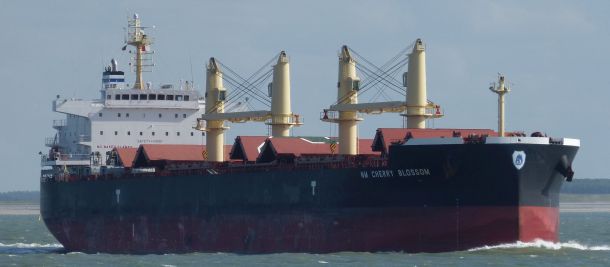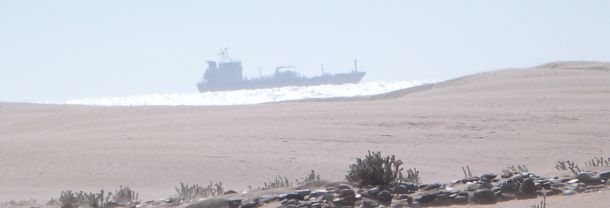
After undertaking work for the Moroccan state phosphate company in Western Sahara, the Danish consultancy giant COWI states that it “will not engage in further projects" in the occupied territory.
PHOTO: Recent construction work near the new OCP port in occupied Western Sahara. The work was advised by Danish COWI.
The international consultancy company COWI has announced that it will undertake no further projects in Western Sahara. The news was dropped in a so-called «Communication on Progress» [or download] filing dated 26 February 2024 to the UN Global Compact (UNGC), where COWI is a participant.
“As long as the situation in Western Sahara remains unresolved and the UN continues to stress that human rights observance in the territory needs improvement, COWI will not engage in further projects located in the said territory”, the company wrote to the UN initiative.
In 2019, COWI initially signed a deal with a foreign company that in turn had a contract for the Moroccan state phosphate company OCP in occupied Western Sahara. The operation related to the building of a new port and factory for exports of fertiliser products from the territory. WSRW first mentioned the controversial COWI involvement in its 2022 edition of the P for Plunder series.
WSRW congratulates COWI with a well founded decision.
“COWI deserves credit for having adopted such a clear position on Western Sahara. We hope other responsible businesses globally will follow COWI’s example. Ethics is not a matter of regulation, but one of common sense. One should not aid and abet an occupying power’s cementing of a foreign occupation. This applies particularly to companies that claim to adhere to the UN Global Compact principles”, stated Morten Nielsen, board member of Western Sahara Resource Watch.
COWI underlined in its statement that the initial engagement at first did “not trigger any warning lights in COWI's project risk screening process" and that there are currently "no regulatory preventions” against the type of work that COWI was assigned to take on.
The company acknowledges, however, that “issues of legal liability are distinct from our responsibility to respect the UNGC principles”. Principle 2 addresses that the company affiliated to the UN Global Compact must support human rights.
“As such, COWI is expected under the UNGC Principle 2, to ensure that our business practices are not complicit in human rights abuses, including being implicated in human rights abuse that another company, government, individual or other group is causing. Whereas we firmly believe that our services on the project in question does not directly cause human rights violations, we acknowledge that they contribute to the development of a territory in which the UN is stressing the importance of improving the human rights, and where several NGOs, including both Amnesty International and Human Rights Watch have well substantiated claims that such human rights of the indigenous inhabitants are not respected. Thus, in order to secure and maintain our firm commitment to strictly complying with UNGC Principle 2, COWI will amend its risk screening process to strengthen focus on risk of human rights violations, including territorial conflicts as part of our basis for decisions to engage in projects in the future”, it stated.
WSRW reckons that the company that COWI worked for may have been the Greek company Archirodon. WSRW first wrote to COWI on 27 January 2022. The company responded to WSRW on 16 February 2022.
In 2011, UN Global Compact excluded the Lithuanian company Lifosa, a subsidiary of Russian EuroChem, as it failed to respond to requests from civil society regarding the company’s imports of phosphate rock purchased by OCP in Western Sahara. Numerous fertiliser companies have dropped the imports of OCP produced phosphate rock in the territory due to international law or human rights. Several Danish investors have excluded previously involved fertiliser companies from their portfolios due to imports from the territory.
Nearly all exports of the conflict mineral in the last years have been exported to India, Mexico and New Zealand, according to WSRW’s daily shipment monitoring.
COWI specializes in engineering, environmental science and economics, with headquarters located in Lyngby, Denmark and has been involved in tens of thousands of projects in nearly all countries of the world.
Since you're here....
WSRW’s work is being read and used more than ever. We work totally independently and to a large extent voluntarily. Our work takes time, dedication and diligence. But we do it because we believe it matters – and we hope you do too. We look for more monthly donors to support our work. If you'd like to contribute to our work – 3€, 5€, 8€ monthly… what you can spare – the future of WSRW would be much more secure. You can set up a monthly donation to WSRW quickly here.
Maersk drops transports of conflict rock from occupied Western Sahara
For decades, a small office in London shipped phosphate rock from occupied Western Sahara to Australia/New Zealand. After one of the world's biggest shipping companies took over the office, the controversial operation will now be closed.
New report reveals the companies transporting conflict phosphate rock
A new report published by WSRW today reveals the names of around 100 shipping companies behind the transport of phosphate rock from occupied Western Sahara in 2016 and 2017.

